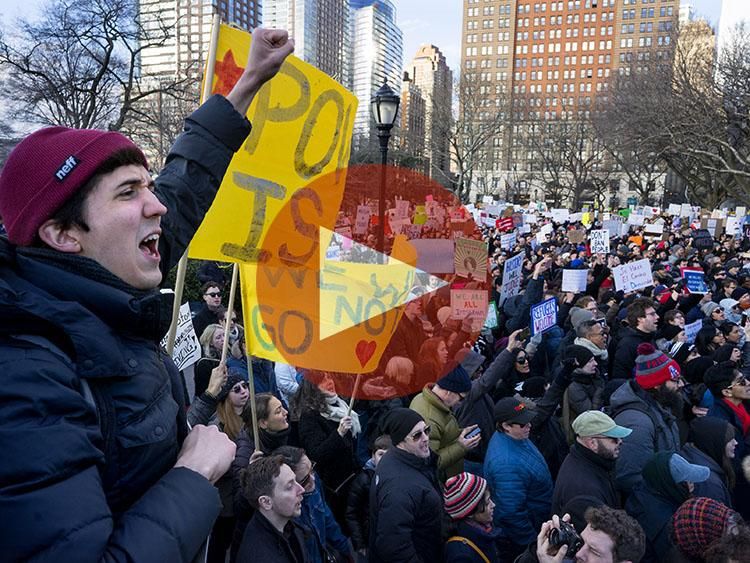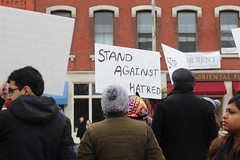Donald Trump’s Unconstitutional, Unconscionable, Immoral Executive Order

On Friday, Donald Trump, who lost the popular vote, signed an executive order that undermines many of the basic principles upon which this country was founded.
The Order suspends U.S. visas and green cards for citizens from 7 Muslim-majority countries. It suspends all refugee admissions for 4 months. And it bars entry for Syrian refugees indefinitely.
On Saturday, government agents at United States airports started stopping men, women, and children who fall into any of these categories. They detained them. And, in some cases, turned them away. This executive action is unconscionable, forcing refugees, even people who have worked for the United States military, into a legal limbo that can endanger their lives. The order is also unconstitutional.
On Saturday night, lawyers from the American Civil Liberties Union (ACLU) won a stay of part of the Order at the federal courthouse in Brooklyn. This is only temporary and it only addresses part of the Order, the part that would have allowed some deportations. The challenge continues. But it should succeed.
This post challenges the Order, discusses how the ACLU won the stay, and what happens next. Future posts will go into more detail.
The Order bans entry into the United States for citizens of Libya, Sudan, Somalia, Yemen, Syria, Iraq, and Iran. Mr. Trump and his team did not choose the countries out of thin air. They are listed in 8 U.S.C. 1187(a)(12), a provision of federal law that takes these countries out of the visa-waiver program. That program allows citizens from many countries to visit the US for short times without visas.
 Choosing these countries actually undermines Mr. Trump’s justification for the Order. He said the Order is intended to protect this country from terrorists. Here are some facts about the relationship between terrorism in the US and these countries. Not a single citizen of these countries has carried out, or even attempted to carry out, an attack on US soil. Of the 19 terrorists involved in the attacks on September 11, 2001, none of their countries of citizenship are on the list. And what about the San Bernardino shooter, or the Pulse Nightclub shooter? They were US citizens, and would not have been subject to this order.
Choosing these countries actually undermines Mr. Trump’s justification for the Order. He said the Order is intended to protect this country from terrorists. Here are some facts about the relationship between terrorism in the US and these countries. Not a single citizen of these countries has carried out, or even attempted to carry out, an attack on US soil. Of the 19 terrorists involved in the attacks on September 11, 2001, none of their countries of citizenship are on the list. And what about the San Bernardino shooter, or the Pulse Nightclub shooter? They were US citizens, and would not have been subject to this order.
These countries, however, do represent over 40% of the American refugee intake (Syria, of course, being the largest source). And so we get stories like this: People prevented from boarding flights; refugees, many of whom spent years going through the process of gaining legal entry into the US to find safety and a better life, stranded in foreign lands; and Iraqis who literally worked as translators and support staff for the American military denied entry. And, don’t forget about the highly educated, pro-American Iranian students stuck overseas and Google recalling its foreign workers because, well, the company has no idea what could happen to its highly educated, productive workforce.
Because the Order applies to only 7 countries, Mr. Trump (and the unsurprisingly supportive Speaker of the House, Paul Ryan, and the very silent and compliant Senate Majority Leader Mitch McConnell) can argue that this is not a “Muslim ban.” Except, it is. It has a carve out for “religious minorities.” The religious minority to which the Order nods, as Mr. Trump himself admitted, is the Christian minority.
Never before has the power of the state been used to create a religious test for entry into this country. President Carter banned certain classifications of Iranians after that country’s 1980 revolution, but it never barred an entire country. And the National Security Entry-Exit program, the post-9/11 immigration policy, did not ban entry, but rather required an additional layer of screening for people coming from countries like Iraq, Syria, and Afghanistan. And, in any event, the NSEE was a failure.
If all of this doesn’t matter, at least one thing is certain: the Order is unconstitutional.
On Saturday, the ACLU won a temporary stay of part of the Order. In particular, anyone wanting to stop a law (or, in this case, an executive order) from going into effect has to demonstrate that she will likely win her case on the merits. That is, to get a stay, you have to make a credible argument that the law or order you want stopped is unconstitutional. The court agreed, presumably because removing someone from this country without due process violates the Due Process Clause and removing someone simply because that person comes from a Muslim-majority country violates the Equal Protection Clause.
The ACLU also showed, quite easily, that implementing the program would do irreparable harm to the victims. Indeed, turning someone away could send them back to a dangerous situation.
The temporary stay also ended with a great line: Until a hearing can be held, the stay “enjoined and restrained” the government “from the commission of further acts and misconduct in violation of the Constitution,” which presumes that what Mr. Trump did was already violating the Constitution. That’s how federal judges throw shade.
There is much more to this story, including the utter incompetence with which Mr. Trump’s order was written and disseminated, the complicity of Republicans in Congress, and the curious silence of affinity organizations whose people have been victimized by refugee bans before.
The world has seen this type of step-by-step erosion of democracy before. We can’t let it happen again.
The post Donald Trump’s Unconstitutional, Unconscionable, Immoral Executive Order appeared first on Towleroad.

Donald Trump’s Unconstitutional, Unconscionable, Immoral Executive Order








 The 23rd Screen Actors Guild Awards are on Sunday night. Out actress Lily Tomlin will be presented with the Life Achievement Award by her friends and 9 to 5 co-stars Jane Fonda and Dolly Parton. Tomlin is also nominated in Outstanding Performance by a Female Actor in a Comedy Series for her work on Netflix’ Grace & Frankie, this makes her only the second actor to be receiving the Life Achievement Award while also in the running as a nominee. In addition to numerous film and TV roles, Tomlin also narrated the 1995 documentary The Celluloid Closet, which was based on the book by her friend and GLAAD co-founder Vito Russo.
The 23rd Screen Actors Guild Awards are on Sunday night. Out actress Lily Tomlin will be presented with the Life Achievement Award by her friends and 9 to 5 co-stars Jane Fonda and Dolly Parton. Tomlin is also nominated in Outstanding Performance by a Female Actor in a Comedy Series for her work on Netflix’ Grace & Frankie, this makes her only the second actor to be receiving the Life Achievement Award while also in the running as a nominee. In addition to numerous film and TV roles, Tomlin also narrated the 1995 documentary The Celluloid Closet, which was based on the book by her friend and GLAAD co-founder Vito Russo. Starz’ drama Black Sails returns for its final season on Sunday night. In the premiere, the invasion of Nassau ends in catastrophe for many. Eleanor works to settle into her new role, while Teach and Rackham look to get revenge for the death of Charles Vane. Black Sails: Sunday, 9pm on Starz.
Starz’ drama Black Sails returns for its final season on Sunday night. In the premiere, the invasion of Nassau ends in catastrophe for many. Eleanor works to settle into her new role, while Teach and Rackham look to get revenge for the death of Charles Vane. Black Sails: Sunday, 9pm on Starz.





